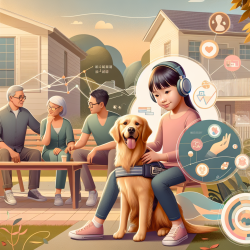As practitioners dedicated to improving the lives of autistic children, it is crucial to continually seek out and implement evidence-based interventions. One such intervention that has shown promise is the placement of service dogs with autistic children. A recent study titled "Service dogs for autistic children and family system functioning: a constant comparative analysis" offers valuable insights into how service dogs can benefit not only the child but the entire family unit.
Understanding the Research
The study conducted by Leighton, Rodriguez, Nieforth, and O’Haire (2023) used a family systems approach to analyze the experiences of 50 caretakers of autistic children, some of whom had service dogs and some who were on a waitlist. The findings were categorized into two primary themes:
- Enhancing Social Functioning of the Family System Unit: Service dogs acted as social bridges, cues, buffers, and catalysts, enhancing social interactions and decreasing stigma.
- Fostering Stability and Strength within Family System Subunits: Service dogs improved family interactions, coregulated with family members, provided individualized support, and were sources of joy and stability.
Implementing Findings in Practice
Practitioners can use these findings to better understand the holistic impact of service dogs on autistic children and their families. Here are some actionable steps:
- Holistic Assessment: Evaluate the family unit as a whole when considering service dog placements. Understand the unique needs and dynamics of each family member.
- Setting Expectations: Clearly communicate the potential benefits and challenges of having a service dog. Setting realistic expectations can help families prepare better.
- Ongoing Support: Provide continuous support and training for the family even after the service dog has been placed. This ensures the dog’s role is maximized for the benefit of the entire family.
Encouraging Further Research
While the current study offers significant insights, it also highlights areas for further research. Future studies could explore the long-term impacts of service dogs on family systems, the experiences of families with different types of service dogs, and the welfare of the service dogs themselves.
By integrating these research findings into practice and encouraging further investigation, practitioners can significantly enhance the quality of life for autistic children and their families.
To read the original research paper, please follow this link: Service dogs for autistic children and family system functioning: a constant comparative analysis.










